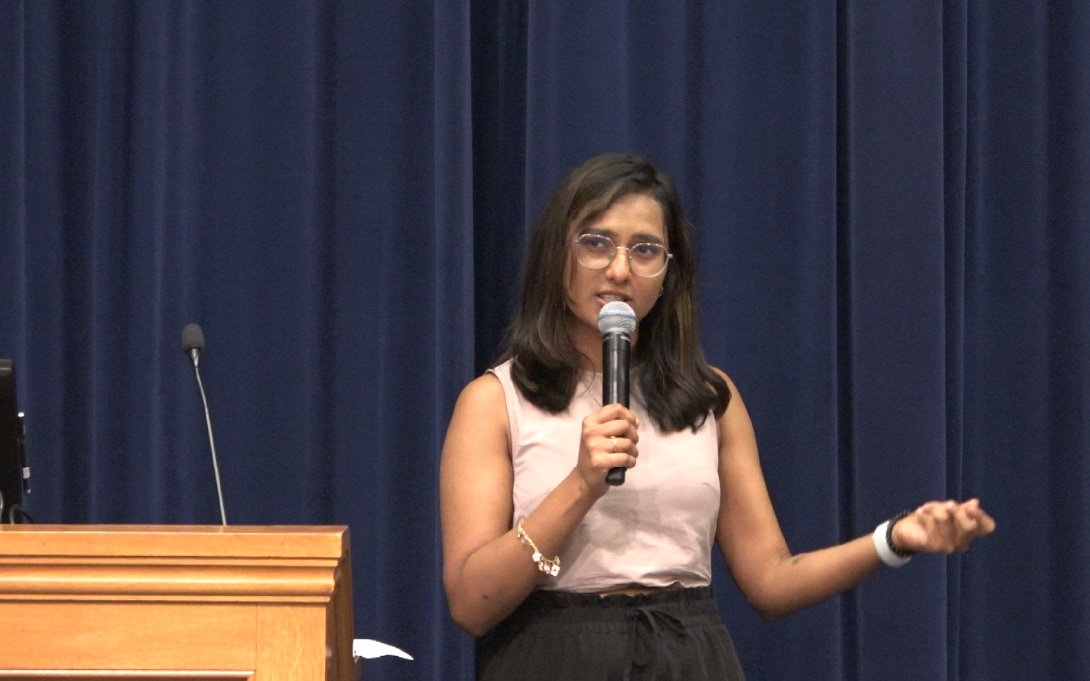
Eleven talented students showcased what they learned during their summer internship at the Ford School 7th Annual Policy Pitch Competition. Undergraduate and graduate students spent three minutes sharing their key deliverables, policy impacts, and lessons learned with the chance to compete for 1st, 2nd, and 3rd student prizes.
The panel of judges awarded students based on the clarity and effectiveness of the presentation, the potential policy impact of their work, and how it influenced the student’s long-term goals. Judges included: Yousef Rabhi, Washtenaw County Commissioner, Rohan Dharan (BA’13), Manager of Secondary Advanced and Enriched Instruction at District of Columbia Public Schools, and Latesha Love-Grayer (MPP’02), Director of International Affairs and Trade at US Government Accountability Office.
Aiswarya Padmanabhan (MPP ‘25) – Trust for Social Achievement
All right, quick show of hands. How many of you here have heard of the Roma people?
Okay, that’s quite a few. I did not. So I’m embarrassed. But how many of you know about the challenges that they face across Europe?
Ish. Okay? I see how it is so often misunderstood and neglected and completely marginalized. The Roma is one of the largest ethnic minority groups in Europe, and yet the challenges that they face remain invisible to the wider world.
Good evening, everyone. My name is Aishwarya, and this summer I had the privilege of pulling back the curtains on this hidden crisis through my internship with the trust for social achievement in Bulgaria.
Now picture this: Neighborhoods where kids are burning their waste to just keep themselves warm for the winter, where industrial pollution chokes the air, and industrial waste is so widespread you could build fortresses from them, and just an area where generations have just been through poverty and exclusion.
This is not a scene from a dystopian novel. This is the daily reality of so many Roma communities in Bulgaria.
The Trust for Social Achievement, or TSA, is a grant-making NGO that is dedicated to overcoming poverty and just achieving greater equity in general with a special focus on the Roma population in Bulgaria.
I’ve always been passionate about international development, but it was not until I walked the streets of some of these Roma communities that I grasped the devastating intersectionality of environmental issues, social justice and public health. My main project at TSA involved me analyzing the air quality in some of these Roma communities, and what we found was that particulate matter levels were exceptionally high in Roma communities, especially over the winter. Now this is where it stops becoming just an environmental issue, and it’s a matter of social justice and public health.
My work included me doing some quantitative analysis, interviewing community members preparing evidence-based advocacy briefs, and our findings unveiled a very disturbing web, complex web of issues. Fundamentally, there’s a lack of adequate heating systems for the Roma community in Bulgaria, and as a result they’re forced to burn whatever they see around them, sometimes even toxic waste just to keep themselves warm.
The Roma communities are also, unfortunately, an industrial dumping ground, so these large corporations come down, dump their industrial waste, harmful substances, such as asbestos, and then they leave.
Now, putting together these practices. What’s happened is that the air quality in these Roma communities is so bad, which is also leading to increasing respiratory diseases, especially among children in these communities.
This internship allowed me to see the power of how data can drive policy change. Now, the problem with the Roma community in Bulgaria is that the government does not care or pay any heed to their needs, so we had to carefully frame our analysis in a way to strategically appeal to them. We had to frame this as a national environmental issue as opposed to just a Roma issue.
But beyond the policy impact, this experience reinforced my passion for international development, and I now more than ever want to be working with international development organizations and focus on project-driven work, where I can see my work making a tangible impact on communities.
Now, as I conclude, I’d like to leave you with one thought: How can we, as professional policy makers, ensure that our data-driven decisions don't lose sight of the human stories behind those numbers?
And with that I will leave you to it. Thank you so much. Enjoy the rest of the pitches.
Read the other pitches:
Georgina Bailey – Lansing Board of Water & Light
Bridget Corwin – Great Lakes Renewable Energy Association
Audrey Dombro – City of Philadelphia, Office of Transportation and Infrastructure Systems
Nia Knox – UM Poverty Solutions
Emily Kuttner – City of Chicago, Mayor's Office
Alexie Milukhin – The Institute for College Access and Success (TICAS)
Samuel Owusu – U.S. House of Representatives, Committee on Education & the Workforce
Aiswarya Padmanabhan – Trust for Social Achievement
Katrina Wheelan – City of Detroit, Office of Budget